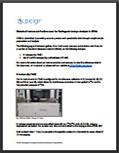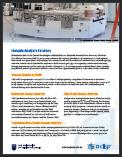We offer high-precision analyses for radiogenic, heavy and light stable isotopic systems using state-of-the-art instrumentation. Samples can be analyzed in solution or in-situ, at ultra-low concentrations, in small sample sizes, and on a variety of sample types.
We offer comprehensive isotopic analysis services from sample preparation and analysis to data compilation optimized for your specific research needs.
We can also provide customized method development for challenging and non-routine isotopic analyses, and hands-on training for students and researchers who are interested in sample preparation techniques and instrumentation.
Radiogenic Isotopic Analysis
PCIGR performs radiogenic isotopic analyses in rocks, minerals, lithic archaeological materials, and biological samples. Simultaneous trace element and isotopic analysis can be achieved via a laser ablation split-stream system. We are also able to develop methods tailored to your research needs.
We offer the following types of radiogenic isotope analyses:
- Sr, Nd and Pb isotopes via thermal ionization mass spectrometer (TIMS) instruments
- Nd, Hf and Pb isotopes via multicollector inductively coupled plasma mass spectrometer (multicollector ICP-MS)
- In-situ Hf isotopes via laser ablation and high-resolution ICP-MS
We repeatedly analyze international (e.g., USGS) and in-house standard reference materials as well as standard solutions (e.g., SRM 987, SRM 981, JNdi and JMC 475) to ensure quality control.
We are committed to providing accurate, precise and reproducible data through careful sample preparation and analysis. To see a gallery of our historical instrument performance, click on the thumbnail image below.

PCIGR-radio-iso-analysis-SRM [PDF]
Heavy Stable Isotopic Analysis
A wide range of heavy stable isotope systems are analyzed at PCIGR via our various Nu Instruments multicollector ICP-MS instruments. Samples can involve a variety of geological and biological matrices. Every effort is made to ensure the highest accuracy and precision in measurement.
Our researchers are actively developing analytical protocols for heavy isotopes (e.g., Ca, V, Fe, Zn, Sr, Tl). Reach out to us for information about these and other heavy isotopic systems.
Light Stable Isotopic Analysis
Light stable isotopes can be measured via our conventional isotope ratio mass spectrometers (IRMS) on a variety of geological, biological and archaeological sample types.
Our IRMS are coupled to peripheral instruments which include an elemental analyzer (EA), gas chromatograph and GasBench.
PCIGR can perform the following types of analyses:
- 13C/12C, 15N/14N and 18O/16O isotopic ratios via IRMS
- Carbon and nitrogen elemental concentrations via stand-alone EA
Isotopic Analytical Capabilities
PCIGR can analyze the following types of sample materials* for isotopes:
- Rocks and minerals (solid, solution or in-situ)
- Sediments, soils and dusts (solid or solution)
- Water (e.g., sea water, lake water, pore water) (solution)
- CO2 gas (IRMS only)
- Plant materials (solid or solution)
- Animal tissue (both soft tissues and mineralized bones and teeth) (solid, solution or in-situ)
- Foods and pharmaceuticals (solid or solution)
- Archaeological materials (solid or in-situ)
- Advanced manufacturing materials (solid, solution or in-situ)
* Please note that PCIGR is not equipped to accept radioactive materials.
Contacts and Costs
For questions about instrumentation and submitting samples to PCIGR, contact:
- Dr. Dominique Weis and Dave Daquioag for radiogenic isotopes
- Dr. Dominique Weis, Dr. Julie Prytulak, and Dr. Marg Amini for heavy stable isotopes
- Dr. Kendra Chritz for light stable isotopes
Please do not submit raw or prepared samples without first speaking to us. Thank you.
Consult the Fees page for detailed analytical and sample preparation costs.
